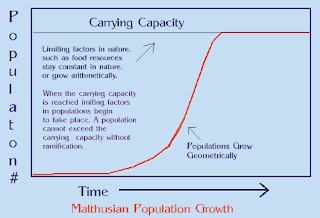Thomas Robert Malthus was born on February 14, 1766 at Dokering, an area south of London. Malthus's father was named Daniel Malthus and was a Jacobin that had worked with other philosophers such as Voltaire, Rousseau, and Hume. Malthus was educated privately by his fathers and a group of private tutors. At 18, he attended Cambridge college where Malthus became a curate, or a person authorized to conduct religious worship, of the Church of England. When Malthus became 38, he got married and left Cambridge. In 1805 he became a professor at Haileybury, a university that was for the general education of the East India Company.
Between 1798 and 1826, Malthus published his major work Essay on the Principles of Population. Malthus argued that when the population is unchecked, it increases at a geometric rate while the food supply increases at a slower rate. The result will be overpopulation and starvation if the human race is not held in check. Malthus stated that there were only two things that kept the population down: vice and misery, two necessary evils being war, famine, and disease. The greatest conclusion of Malthus's Essay on the Principles of Population was that the unchecked population will surpass man's ability to live on this planet.
"The superior power of population cannot be checked without producing misery or vice."-Thomas Malthus
Malthus also argued that two types of checks hold population within resource limits: positive checks, which raises death rates; and preventative checks, which lowers birth rates. Malthus had been a realist that had been picked on by the idealists because of his work. There was much criticism by other people that led Malthus to make six different updated editions of Essay on the Principles of Population that included his more updated ideas and responses to the criticism of the critics. Malthus believed that misery and poverty were the inevitable results of the law of nature; no government or person should interfere with it.
Since Malthus was a believer in God as a clergyman, Malthus had the belief that God had the created the tendency for human population to grow, but He had the constant, harsh threat of poverty and starvation to teach the virtues of hard work and good behaviour. Malthus saw poverty as a positive check on population as people would have less offspring that they could not support. Including to that, as wages increased, birth rates were expected to increase while the death rates would drop. To him, increased wages led to population growth.
Thomas Malthus had miscalculated his ideas and had failed to take several factors into consideration. The Industrial Revolution had advances in sanitation, technology, and food- distribution that had led to declining death rates. The new mechanized farms were producing more produce per acre and birth control helped control the rate of births.
"It is an acknowledged truth in philosophy that a just theory will always be confirmed by experiment."
-Thomas Malthus
Thomas Robert Malthus died on December 29, 1834 passing on his knowledge for later generations to come.
"I think it will be found that experience, the true source and foundation of all knowledge, invariably confirms its truth."-Thomas Malthus
"Thomas Robert Malthus." Wikipedia, the Free Encyclopedia. 15 Feb. 2011. Web. 17 Feb. 2011. http://en.wikipedia.org/wiki/Thomas_malthus.
Spielvogel, Jackson J. Western Civilization. 6th ed. Vol. Combined. Southbank, Vic.: Thomson Wadsworth, 2006. Print.

Thomas Malthus! I have been overseeing your documentation and the information that you note down from society. I must say that I am interested in the population statistics that you have accumulated over the years. Perhaps we should meet somewhere in Paris since presently I am currently working on an exclusive peace of great literature along with my great friend Friedrich Engels which will surely influence ages to come. We must converse about the population growth and the economic motives to deal with them!
ReplyDelete-Karl Marx
Hello Thomas, I have read your Essay on the Principles of Population and I was quite intrigued. Your idea that the unchecked population will cause severe overpopulation and is limited by positive and preventive checks at first is quite confusing. Though I eventually understood it and in some sense it actually works! This is truly fascinating, is there by any chance that I can get your autograph?
ReplyDeleteI always think for the benefit of the nation. I even wrote a book about it to share my knowledge! I believe this is why your idea about overpopulation greatly interests me. Your thoughtfulness regarding the dearth in food supplies from the growth of population is agreeable too. I will like to investigate your ideas so I myself can add to the factors that will help make a nation more prosperous.
ReplyDeleteI was interested in your work and thought it was quite good. You have shared your ideas on the world to improve and help your economy. Your work has been truly inspiring and helpful. Although we all often try to benefit the world, we are often shunned by those around us. Keep up the good work in trying to help your nation as I have tried to do so myself.
ReplyDelete